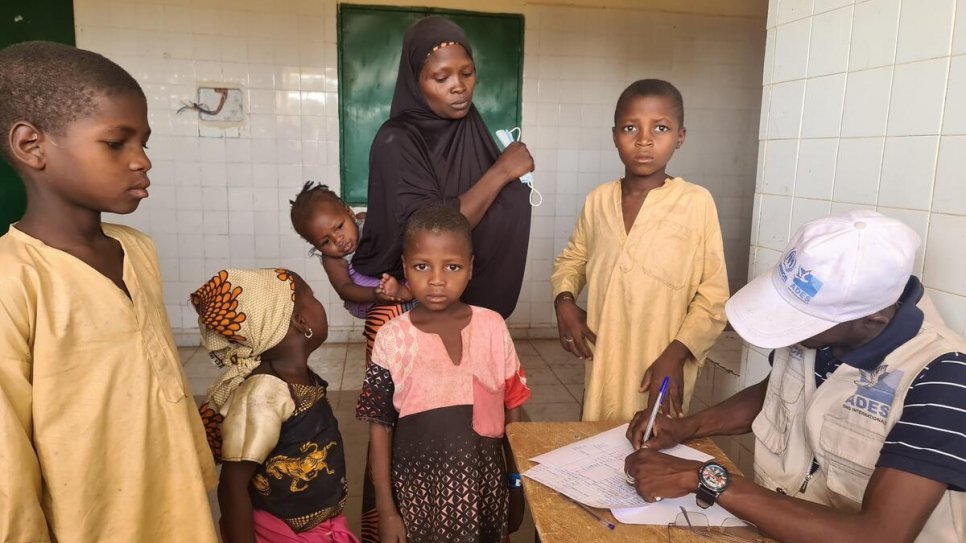Bandit attacks drive Nigerian villagers to flee to Niger
Killings, kidnapping and looting have driven 11,500 Nigerians to seek safety in Niger's Tahoua region in November.
UNHCR staff register Nigerian refugees in Bangui, a village in the Department of Madaoua in Tahoua region, Niger.
© UNHCR/Boubacar Younoussa Siddo
Over three nights in November, armed groups, locally called “bandits,” attacked villages in the border area of Sabon Birni, Sokoto State in Northwest Nigeria.
Armed men stormed Rachida Naino’s village in the middle of the night. “We heard gunshots, they were stripping people from all their belongings,” says the 30-year-old mother of five. “After an hour, they came to us and asked for money My husband replied: 'I have no money, I am a simple farmer, I only have my crop to give you.’”
"The armed men were not convinced," Rachida continues. "They called my husband a liar and shot him dead, then they burned our grain stock.”
Stories of murder, kidnapping for ransom and looting are common among the 11,500 Nigerians who have arrived since mid-November in Niger’s Tahoua region.
The violence comes against the backdrop of intercommunal clashes between farmers and herders as competition increases for dwindling resources, aggravated by the climate crisis.
"They called my husband a liar and shot him dead, then they burned our grain stock.”
The November arrivals, mostly women and children, have taken refuge in 26 villages in the rural commune of Bangui. The area was already home to 3,500 Nigerian refugees since September. There are close family ties between the two sides of the border.
Garba Guirey, 71, is now staying at his cousin’s house. "When the gunmen attacked us, they killed the young men," he says. "My son was one of them. I didn't have crops in my granary, so they set fire to our fields. I managed to flee but I have no news of my wife and children.”
The new arrivals need water, food and shelter. In coordination with Nigerien authorities, UNHCR, the Refugee Agency, is registering them, identifying the most vulnerable, and providing emergency assistance, including shelters.
UNHCR and partners are also strengthening local health and education infrastructure in Bangui. including building latrines for 12 schools and water access for six others. The main health centre in Bangui will be connected to water and electricity and five smaller health centres will be provided with staff.
“This wave of attacks reflects the intense activity of criminal groups in northern Nigeria and raises fears of further displacement,” said Emmanuel Gignac, UNHCR's
representative in Niger. “We call on the international community and to donors to step up their efforts to put an end to the vicious circle of violence engulfing the region and to assist its population.”
"We call on the international community to step up their efforts to put an end to the vicious circle of violence."
Niger now hosts more than 200,000 Nigerian refugees, including 57,000 refugees from north-west Nigeria in Maradi region, and 15,000 in Tahoua region. In total, some 600,000 refugees and internally displaced people live in the country.
“We commend the generosity of Niger and its people. They have always kept their doors open, regardless of the myriad challenges they face,” Gignac added.
The Central Sahel countries of Burkina Faso, Mali, and Niger are at the epicentre of one of world's fastest-growing displacement and protection crises. More than 900,000 refugees and nearly 2.5 million internally displaced people are hosted in the region.
In Niger, humanitarian efforts to respond to the emergency are dangerously overstretched. UNHCR's operation, which requires US$110.7 million for 2021 is 65 per cent funded. Continued and increasing support is needed for UNHCR to continue providing life-saving assistance.


